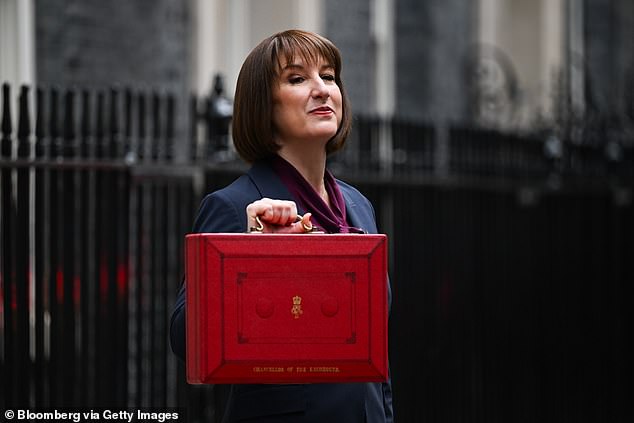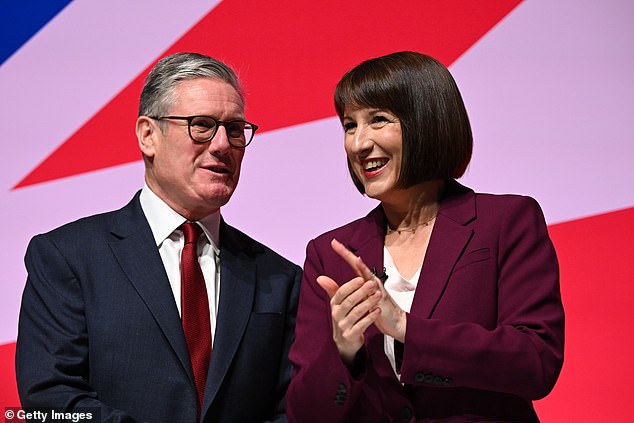So that’s it, then. After her unexplained tears in the Commons last week, Rachel Reeves has decided that taxes will have to go up again in the autumn Budget even though she previously said they wouldn’t.
The Chancellor told the Guardian newspaper on Saturday that it was impossible to rule out tax increases, which is a politician’s way of saying they’ll have to rise. She said that ‘there are costs’ after the welfare Bill was virtually abandoned last week.
With Cabinet colleagues, she has been even more candid, reportedly telling them that the next batch of hikes is likely to produce even more political turbulence than the £40billion package she imposed last November, which has inflicted so much damage on the economy.
The view that there is no alternative is prevalent not just in Labour circles but with many think tanks, most banks and much of the commentariat. Even the Tories and Reform, though critical of higher taxes, appear to believe that Ms Reeves has run out of road.
Paul Johnson, the outgoing head of the Institute of Fiscal Studies, reckons the Chancellor may have to raise as much as £30billion – far more than the estimated £5billion cost of Labour ditching its modest welfare reforms.
He also suggests that she won’t be able to raise a sum of this magnitude simply by imposing new taxes on the wealthy. He thinks she will have to look at the three largest revenue raisers – income tax, National Insurance and VAT – which Labour promised in its manifesto not to touch.
No doubt this betrayal will generate a lot of guff from Ms Reeves and Sir Keir Starmer about how the world has changed, and how unforeseeable events have regrettably necessitated further taxes.
And so it will go on. Record after record will be broken, so that every year statisticians will tell us we have never paid so much tax in peacetime.

UK Chancellor Rachel Reeves outside of No 11 before presenting her budget to Parliament last October
As the next election approaches, the Government may try to spare ordinary taxpayers from another round of increases and turn its guns exclusively on the better-off. One way or another, everyone is going to cop it.
But there is of course an alternative – if Starmer and Reeves had enough gumption and courage. They should ignore the special interest groups which claim that public spending was cut to the bone by the wicked Tories and recognise that the State has become bloated and wasteful.
According to the Office for Budget Responsibility, public spending amounted to a record £1,279billion in 2024-25. Most of this money came from tax receipts, though £137billion was borrowed at increasingly exorbitant rates.
Can anyone honestly maintain that no savings can be found within this vast splurge of expenditure? Any private company living beyond its means, as this country most certainly is, would slash costs – starting off by shedding labour.
If the Government were to reduce expenditure by just 5 per cent – not a formidable amount, and much less than a sensible business would aim to do in dire circumstances – the saving in the last financial year would have been £64billion, which is more than the annual defence budget.
Received wisdom, which is imbibed in large doses by Starmer and Reeves, says it can’t be done, especially after years of supposed austerity. Received wisdom is wrong.
How can spending be under control when £100million of public money is squandered on a special tunnel for bats on the shambolic HS2 rail scheme? In fact, the whole of HS2 – latest estimated cost, £86billion – is probably a waste of public money since passengers will get from London to Birmingham only about 25 minutes quicker.
And what about the £101million being paid annually to Mauritius for 99 years in return for a lease on a base in the Chagos Islands, for which a previous government had already paid £3 million in 1968? What a stunning example of Labour’s careful stewardship of public funds!
Let me make a few suggestions. The Government could make a useful start by cutting the civil service, which has grown by 123,000 since the 2016 Brexit referendum. No one would claim that this country is better run than it was nine years ago.
Civil service middle managers have proliferated, many of whom are paid handsomely. Say the net individual cost of a civil servant hired since 2016 is £50,000 a year. Reverting to the staff levels of nine years ago would save an annual £6.15billion.
Then there are ballooning welfare payments. Pundits assume that, having been seen off last week by rebel Labour MPs over its minor proposed reforms, the Government won’t dare return to the subject. Maybe so. But it would be pure cowardice to run away from the issue.

Do I think there is any chance that Starmer and Reeves will embrace reform of the public services? I’m afraid not
The entire welfare budget must be re-examined – and next time Starmer should concentrate his mind on the issue and attempt to win over Labour MPs, rather than being, as he put it, ‘distracted’ by other matters. What a shameful admission.
Spending on health and disability-related benefits – with which the Government tried and failed to tinker last week – is currently £65billion a year and projected to reach £100billion by 2029. This is unaffordable for a country with minimal economic growth.
Starmer and Reeves don’t understand that to govern is to make difficult decisions. It’s not about handing over large cheques to ravenous special interest groups who have no responsibility for public spending and don’t care how much money the Government shells out.
Of course, this all takes time. There is bound to be resistance. You can’t cut public expenditure in a day. There has to be a plan and, even more important, an unshakeable will behind it. The last person in British politics to possess such a will was Margaret Thatcher. She also realised that reform must be gradual.
Do I think there is any chance that Starmer and Reeves will embrace reform of the public services? I’m afraid not. They will only be driven to doing so when foreigners stop lending us money.
The irony, of course, is that reducing the size of the inefficient, bloated British State is the only conceivable way by which Labour can save itself from political annihilation.
For the path Rachel Reeves has decided to take – raising taxes year by year in defiance of manifesto pledges and to the certain detriment of the economy – will make Labour unelectable for a generation.
It may also make Britain practically ungovernable by 2029. Our best hope is that the Tories and Reform will show how we can live within our means. Given that the cost of Nigel Farage’s recent pledge to raise the threshold for paying income tax to £20,000 has been put at between £50billion and £80billion, the Tories may be a safer bet.
Rachel Reeves cried in the Commons last week for reasons that she has, disgracefully in my view, refused to disclose. The state of the Chancellor’s mind, if disturbed, is surely our business.
If she goes on raising taxes, and fails to address waste and inefficiency, these will only be the first drops of what will become a torrent of tears for her and the British people.












